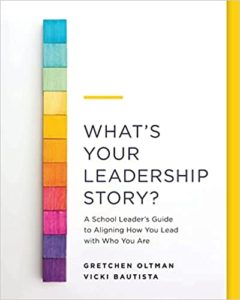Aligning How You Lead with Who You Are
What’s Your Leadership Story? A School Leader’s Guide to Aligning How You Lead with Who You Are
By Gretchen Oltman and Vicki Bautista
(ASCD, 2021 – Learn more)
Reviewed by Sarah Cooper

Ideally, such knowledge will enable them to stay in the profession of school administration for a long time – a longevity we sorely need now, with so many educational leaders finding job demands more challenging than ever.

Articulating your leadership journey
The thesis of What’s Your Leadership Story? is that articulating your journey, along with your goals and vision, will help you thrive: “If you can authentically tell your story so your school community can know you, what you value, and why you make decisions the way you do, then you will build a stronger connection with those you lead and work beside.” Not incidentally, you will preserve important parts of yourself in the process.
Gretchen Oltman and Vicki Bautista, both professors in the department of interdisciplinary studies at Creighton University in Nebraska, have mentored and taught school leaders. All the chapters in this easy-to-read book lead toward writing a PLP, or personal leadership philosophy:
- How Can I Be More Than My Title?
- Effects of the PLP on Today’s Leaders
- What Is My Leadership Style?
- What Are My Core Values?
- What Is My Mindset?
- How Do My Real-Life Experiences Make Me Unique?
- Crafting My PLP
- PLP Examples
- Putting My PLP Into Practice
- Our Leadership Philosophies
Purpose-driven self-understanding
I appreciated the practical honesty of the entire book and especially Chapters 7 and 8, which featured first and second drafts of a number of administrators’ PLPs and pointed out common missteps that come with being “the dreamer,” “the overconfident leader,” “the humble leader,” “the list maker” and many other types.
In addition, even after being an academic administrator for over a decade, I found it helpful to reconsider my core values and surprisingly difficult to narrow them down to three. At least for now I prioritized curiosity, vision and understanding, while leaving commitment, willingness to learn, acceptance, kindness and passion on the table as close runners-up.
Throughout the book I was also inspired by purpose-driven questions, such as these in the chapter urging an evolving mindset:
- Why do I do this job?
- What do I hope others see in me when doing this job?
- As a school leader, what do I want others to remember about me?
As the authors note, “Authentic leaders who lead with clarity and purpose find room for all necessary facets of their different identities to coexist.” Engaging with this book will help especially newer leaders articulate their purpose and bring their whole selves to school each day.
Sarah Cooper teaches eighth-grade U.S. history and is Associate Head of School at Flintridge Prep in La Canada, California, where she has also taught English Language Arts. Sarah is the author of Making History Mine (Stenhouse, 2009) and Creating Citizens: Teaching Civics and Current Events in the History Classroom (Routledge, 2017). She presents at conferences and writes for a variety of educational sites. You can find all of Sarah’s writing at sarahjcooper.com.


































